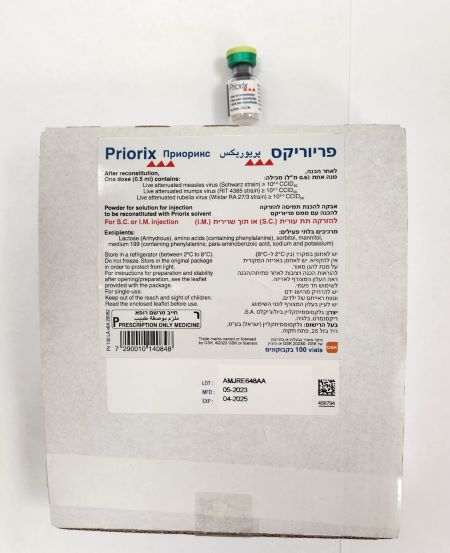Quest for the right Drug

פריוריקס PRIORIX (LIVE ATTENUATED MEASLES VIRUS, LIVE ATTENUATED MUMPS VIRUS, LIVE ATTENUATED RUBELLA VACCINE, LIVE ATTENUATED RUBELLA VIRUS)
תרופה במרשם
תרופה בסל
נרקוטיקה
ציטוטוקסיקה
צורת מתן:
תת-עורי, תוך-שרירי : S.C, I.M
צורת מינון:
אבקה וממס להכנת תמיסה להזרקה : POWDER AND SOLVENT FOR SOLUTION FOR INJECTION
עלון לרופא
מינוניםPosology התוויות
Indications תופעות לוואי
Adverse reactions התוויות נגד
Contraindications אינטראקציות
Interactions מינון יתר
Overdose הריון/הנקה
Pregnancy & Lactation אוכלוסיות מיוחדות
Special populations תכונות פרמקולוגיות
Pharmacological properties מידע רוקחי
Pharmaceutical particulars אזהרת שימוש
Special Warning עלון לרופא
Physicians Leaflet
Adverse reactions : תופעות לוואי
4.8 Undesirable effects Summary of the safety profile The safety profile presented below is based on a total of approximately 12,000 subjects administered PRIORIX in clinical trials. Adverse reactions which might occur following the use of a combined mumps, measles, rubella vaccine correspond to those observed after administration of the monovalent vaccines alone or in combination. In controlled clinical studies, signs and symptoms were actively monitored during a 42-day follow-up period. The vaccinees were also requested to report any clinical events during the study period. The most common adverse reactions following PRIORIX administration were injection site redness and fever 38°C (rectal) or 37.5°C (axillary/oral). Tabulated list of adverse reactions Adverse reactions reported are listed according to the following frequency: Very common (1/10) Common (1/100 to <1/10) Uncommon (1/1,000 to <1/100) Rare (1/10,000 to <1/1,000) Clinical trial data System Organ Class Frequency Adverse reactions Infections and infestations Common upper respiratory tract infection Uncommon otitis media Blood and lymphatic system Uncommon lymphadenopathy disorders Immune system disorders Rare allergic reactions Metabolism and nutrition Uncommon anorexia disorders Psychiatric disorders Uncommon nervousness, abnormal crying, insomnia Nervous system disorders Rare febrile convulsions Eye disorders Uncommon conjunctivitis Respiratory, thoracic and Uncommon bronchitis, cough mediastinal disorders Gastrointestinal disorders Uncommon parotid gland enlargement, diarrhoea, vomiting Skin and subcutaneous tissue Common rash disorders General disorders and Very common redness at the injection site, fever administration site conditions 38°C (rectal) or 37.5°C (axillary/oral) Common pain and swelling at the injection site, fever >39.5°C (rectal) or >39°C (axillary/oral) In general, the frequency category for adverse reactions was similar for the first and second vaccine doses. The exception to this was pain at the injection site which was “Common” after the first vaccine dose and “Very common” after the second vaccine dose. Post-marketing data The following adverse reactions have been identified in rare occasions during post- marketing surveillance. Because they are reported voluntarily from a population of unknown size, a true estimate of frequency cannot be provided. System Organ Class Adverse reactions Infections and infestations Meningitis, measles-like syndrome, mumps- like syndrome (including orchitis, epididymitis and parotitis) Blood and lymphatic system disorders Thrombocytopenia, thrombocytopenic purpura Immune system disorders Anaphylactic reactions Nervous system disorders Encephalitis*, cerebellitis, cerebellitis like symptoms (including transient gait disturbance and transient ataxia), Guillain- Barré syndrome, transverse myelitis, peripheral neuritis Vascular disorders Vasculitis Skin and subcutaneous tissue disorders Erythema multiforme Musculoskeletal and connective tissue Arthralgia, arthritis disorders * Encephalitis has been reported with a frequency below 1 per 10 million doses. The risk of encephalitis following administration of the vaccine is far below the risk of encephalitis caused by natural diseases (measles: 1 in 1,000 to 2,000 cases; mumps: 2-4 in 1,000 cases; rubella: approximately 1 in 6,000 cases). Accidental intravascular administration may give rise to severe reactions or even shock. Immediate measures depend on the severity of the reaction (see section 4.4). Reporting of suspected adverse reactions Reporting suspected adverse reactions after authorisation of the medicinal product is important. It allows continued monitoring of the benefit/risk balance of the medicinal product. Any suspected adverse events should be reported to the Ministry of Health according to the National Regulation by using an online form (https://sideeffects.health.gov.il/). Additionally, you should also report to GSK Israel (il.safety@gsk.com).

פרטי מסגרת הכללה בסל
החיסון יינתן במקרים האלה:א. כחלק מחיסוני השגרה לילדים בישראל.ב. שתי מנות חיסון עבור בני 18 ומעלה העונים על:1. ילידי שנת 1957 ואילך.2. לא חוסנו בשתי מנות חיסון נגד חצבת מגיל 12 חודשים ומעלה במרווח של 4 שבועות לפחות בין המנות. עבור מטופל שלא זוכר אם חוסן ואין תיעוד לכך, יהיה המטופל זכאי לקבל עד שתי מנות חיסון. מטופל שחוסן במנה אחת יהיה זכאי לקבל מנה חיסון אחת.החיסון יינתן בהתאם להנחיות שירותי בריאות הציבור, שיתעדכנו מעת לעת.
מסגרת הכללה בסל
התוויות הכלולות במסגרת הסל
| התוויה | תאריך הכללה | תחום קליני | Class Effect | מצב מחלה |
|---|---|---|---|---|
| שתי מנות חיסון עבור בני 18 ומעלה העונים על: 1. ילידי שנת 1957 ואילך. 2. לא חוסנו בשתי מנות חיסון נגד חצבת מגיל 12 חודשים ומעלה במרווח של 4 שבועות לפחות בין המנות. עבור מטופל שלא זוכר אם חוסן ואין תיעוד לכך, יהיה המטופל זכאי לקבל עד שתי מנות חיסון. מטופל שחוסן במנה אחת יהיה זכאי לקבל מנה חיסון אחת. | 30/01/2020 | מחלות זיהומיות | ||
| כחלק מחיסוני השגרה לילדים בישראל. | 01/01/1995 | מחלות זיהומיות | ||
| שתי מנות חיסון עבור בני 18 ומעלה העונים על: 1. ילידי שנת 1957 ואילך. 2. לא חוסנו בשתי מנות חיסון נגד חצבת מגיל 12 חודשים ומעלה במרווח של 4 שבועות לפחות בין המנות. עבור מטופל שלא זוכר אם חוסן ואין תיעוד לכך, יהיה המטופל זכאי לקבל עד שתי מנות חיסון. מטופל שחוסן במנה אחת יהיה זכאי לקבל מנה חיסון אחת. | 30/01/2020 | מחלות זיהומיות | ||
| כחלק מחיסוני השגרה לילדים בישראל. | 01/01/1995 | מחלות זיהומיות |
שימוש לפי פנקס קופ''ח כללית 1994
Routine immunization of children 15 months or older. Children up to the age of puberty who were not vaccinated and who did not experience the natural infection
תאריך הכללה מקורי בסל
01/01/1995
הגבלות
תרופה מוגבלת לרישום ע'י רופא מומחה או הגבלה אחרת
מידע נוסף
